

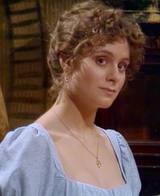
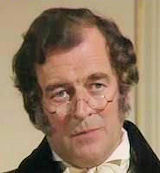
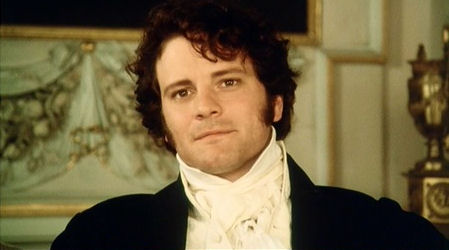
I didn't always permit filmmakers to have their way with me. I remember as a child coming home from The Count of Monte Cristo and indignantly informing my father that the film was nothing like the novel. 'It never is,' he said in a resigned tone.
Well. If filmmakers are permitted to take a person's favourite book, leave out the best chapters and change the rest to an entirely different story, what could it possibly benefit that person to watch a film adaptation? I decided never again to do so, at least not of a well-loved novel. And I never did.
And yet. The tragedy of life is that we lose our youthful idealism, our moral certainty and incapacity for compromise. So it happened recently [if you permit me to consider 2005, when these paragraphs were first written, recent] that I saw the last four episodes of a six-part televised BBC miniseries from 1995 of Pride and Prejudice. 'Pride and Prejudice'! — a book read so often that I can recite entire paragraphs by heart. The series was an abject failure, so awful that I went to the local library to catch up on the first two episodes. For some reason they gave me an earlier BBC five-part miniseries from 1980. Another complete failure. We bought it on videocassette, and then on DVD.
[In fact, I saw the first two episodes of the 1995 series for the first time in February 2008 — answering certain questions and raising others in their place — but in the main I stand by my original text.]
Before going back to the Novel, I watched a version filmed in Hollywood in 1940, in which Mr. Darcy is played as a grinning fool. It appears that Hollywood in the 1940s was as contemptuous of the rules of architecture as of the spirit of a classical novel like Jane Austen's iconic Pride and Prejudice. It's possible the filmmakers honestly believed that in hiring several writers including Aldous Huxley they were modernizing the Novel, making it accessible to an audience that would scorn the old-fashioned words and ways of a vanished long-ago England. It's possible they believed that rather than laying the foundation for what is to come, it is permissible to invent a different introductory story altogether, full of 'clever' dialogue meaning nothing, going nowhere, and falling on today's ears like the thud of gravel dumped onto unprepared ground.
Only well into the film does even a single line of Austen's matchless prose sparkle like a sudden Spring shower of rubies and diamonds into the mud pit. It seems to me that all the disastrous decisions that follow — not least the truly shameful waste of a potentially marvellous Mr. Darcy as envisioned and described by Jane Austen — are caused by this initial failure of judgment.
At that point I found and and re-read my copy of Jane Austen's masterpiece. And realized what everyone else probably learned many years before: rather than detract from the Novel, the best screen treatments add other deeper layers to a well-loved book. (So, too, do the excruciatingly bad ones.) For a number of reasons.
* * * * *
Firstly, in the case of Pride and Prejudice (unlike Dickens's works, for example), Jane Austen's classic Novel is almost entirely devoid of descriptive passages. (Devoid also of the pages of dialect that made assignments of other British authors such a hideous experience for a child — but that, as they say, is another story.) We are given razor-sharp characterizations and sublime dialogue; we are told of personages, of houses, villages, estates, of balls and dances, dresses, carriages and customs, but are left in the dark as to distinctive visual elements of person or place.
Any information we have regarding even the heroine's physical appearance we owe to Mr. Darcy's interior musings, explaining how it comes to pass that he had
... no sooner made clear to himself and his friends that Elizabeth Bennet had hardly a good feature in her face than he began to find it was rendered uncommonly intelligent by the beautiful expression of her dark eyes. He wished to know more of her...
And though he had detected
... more than one failure of perfect symmetry in her form, he was forced to acknowledge her figure to be light and pleasing.
Apart from that — nothing, except an odd fair countenance here, and lovely there.
As for Jane, beautiful Jane, acknowledged as a sweet girl by Mr. Bingley's overly-critical sisters — Was she dark? Fair? Tall? Petite? Our imaginations are free to conjure up whichever vision of perfect beauty appeals to us.
But an idealized image is no proof against a filmed characterization: whether we wish it or not, watching a filmed novel renders the original impossible to read without seeing the actors in their assigned roles. Which actors, if one has seen several differing versions? Why, whoever happens to suit the particular scene: Insofar as image is concerned, it makes no difference. The case is entirely different, however, as concerns sound. Only the best performers succeed in imposing their voices over a book's written dialogue. And then, what a delicious experience to hear in our mind's ear a well-loved morsel of dialogue in the voice of a consummate master of the theatrical arts! In this case, memory completely replaces — overwrites, as it were — imagination.
Because after the first few readings even of a masterpiece, words mean what we have come to expect them to (unless, of course, personal experience so changes us that meanings alter or intensify, but that happens infrequently, and our favourites remain our favourites precisely because we can trust them not to tell us more than we wish to know.) The Pride and Prejudice films and miniseries take those words and phrases and hold them up to blinding light.
Secondly, as in the example referred to earlier, of Mr. Darcy's sentiments regarding Elizabeth's attractiveness or lack thereof, no satisfactory method exists of showing such a marked and unwilling reversal of feelings. Without knowledge of this fact, the story loses much of its charm. But having lacked it on film, we linger later sensuously over the page on which it is to be found.
We've realized for the first time that Pride and Prejudice is the greatest romantic love story in English literature. And the factors that make it such a magnificent piece of writing, prevent its ever being filmed successfully. Not if the film runs for ten hours, or thirty. Because, as scientists have recently confirmed, matters of the heart take place entirely in the mind. Well, maybe not entirely in the mind, but this, after all, is Jane Austen.
Which bring us to the inherent frustrations of the present section. What is the way of the eagle in the air? a serpent upon a rock? a ship in the midst of the sea? and even the way of a man with a maid? compared to the capacity of the human mind for thinking on seven or eight simultaneous levels? It is incontrovertible fact that while watching one miniseries we keep track of each addition to and subtraction from the book, as well as every detail in which it deviates from the second televised presentation. We decide if we prefer the present version of a scene, or do not. We sort, sift, judge, allot, allocate, marvel, deplore, and, often enough, artlessly enjoy.
And the Novel, which we used to breeze through in a night or two, now requires much time and attention, as things well known are suddenly perceived as exotic, alien. Was that paragraph always there? And how can it be that I never noticed its oddness?
In 1980, a mere forty years after that truly terrible early movie, the BBC in Britain decided to take the opposite route: with love and rigour and conscientious attention to detail they crafted a five-part miniseries that came as close to recreating the original Novel as will ever be attempted or achieved.
Elizabeth is Elizabeth Bennet exactly as described in Austen's Novel — all lovely dark eyes, playful manner, expressive voice full of self-deprecation and humour, and with her father's delight in the ridiculous and habit of using irony as a means to keep others, even her beloved Jane, at a safe distance.
The 1980 Mr. Darcy is suitably tall, dark and wooden; Jane is good and lovely just as she ought; Mr. Wickham is golden-haired and angelically fair of countenance and bearing; Mr. Bennet in particular could not be improved upon as we see the inherent and unmistakeable tragedy driving his excruciatingly funny conversation.
Every other personage [with one exception *] seems perfect for the visual representation of a particular role, in appearance, and, especially, in voice — utterly crucial in bringing to visual life so consummate a master of dialogue as Jane Austen.
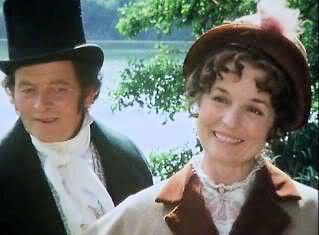
Lovers of the Novel should have been happy. And we were happy, even though a small voice told us that the 1980 miniseries contained everything in the Novel, and less, particularly with regard to Mr. Darcy. Which explains, perhaps, the BBC decision in 1995 to fashion a new miniseries, with Mr. Darcy the focal point of the series.
You don't ask a Mr. Darcy who is the main character in a six-part miniseries to sit about waiting while you mess about establishing sub-foundation and support. When the emphasis has been shifted to Mr. Darcy as the main character, you begin with Mr. Darcy. You end with Mr. Darcy. And, no matter what is being shown on screen, the focus remains on Mr. Darcy throughout all six episodes of the 1995 series.
Architecturally, the effect is similar to commencing construction with a thin wedge — rather like building an upside down pyramid which, once commenced, can never be righted. Every event, every action, every personage will be viewed through the lens of how and why this new development concerns Mr. Darcy. I'm not necessarily complaining. Only describing. If such a rendering of Mr. Darcy enables us to see an actual human being rather than a rigid figure enclosed within a protective suit of armour, how can the end not justify the means?
And inverted pyramid be damned: Sometimes the strange and unearthly can be just as true as — perhaps truer than — the faithful replication.
Before crediting Jane Austen with a perfectly constructed novel, I suggested that Pride and Prejudice is the greatest romantic love story in the English language. If film is able to take the direct non-stop route to that end, why not do so? Especially since nothing prevents, and everything encourages, the film viewer moving to the Novel.
The 1995 miniseries and Jane Austen's Novel are complementary: one concerned with results rather than process, action at the cost of characterization, the visual even if often in blatant contradiction to the spoken; the other reflective, descriptive, ironic, marvellously aware of character as the driving force of action and reaction and of the essential role of dialogue in illuminating character.
The 1995 miniseries, in other words, exists in its own right as film rather than merely a filmed novel. It seems a pity that, with the exception of Mr. Darcy [and one other character * ], this visual feast is populated by caricatures rather than the vibrant personages delineated by Austen. But is this not the price of commencing with Mr. Darcy, rather than laying the groundwork of the story and then building up to his disruptive entrance?
* * * * *
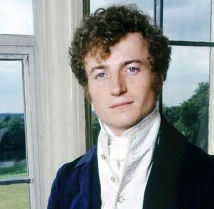 [ * Strangely, unexpectedly, the exception
proves to be the 1995 Mr. Bingley.
[ * Strangely, unexpectedly, the exception
proves to be the 1995 Mr. Bingley.
Someday, I intend to write a chapter on the succession of waves rolling in to break at our feet from the inexhaustible ocean of words and phrases contained in Jane Austen's Pride and Prejudice, each wave composed of two sharply drawn individuals combined into one distinctive unmistakeable couple, beginning with Mr. and Mrs. Bennet, and culminating in the seedy duo of Lydia Bennet and Mr. Wickham.
It has appeared to me that the Jane/Bingley pairing marred that perfection. But of course my internal vision was of the BBC 1980 Bingley, a large exuberant boy. Affectionate, but a puppy still, easily led, lacking in strength, unlikely to form with Jane that perfect wave necessary to ensure the effortless tidal sequence. Then I watched the first two episodes of the 1995 miniseries, and Mr. Bingley as the slightly-built young man Jane Austen surely had in mind with Bingley's declaration to Elizabeth at Netherfield:—
'I assure you, that if Darcy were not such a great tall fellow, in comparison with myself, I should not pay him half so much deference.'
In other words, a playful young man who defers to the opinions of his older friend Darcy not out of weakness but respect. As for his willingness in a later chapter to defer to the decisions of Darcy and his sisters to leave Netherfield as quickly and unexpectedly as they arrived, it is difficult to disbelieve the natural youthful hesitance and deference displayed by the 1995 Bingley toward Mr. Darcy, his wiser and far more experienced guest.
And surely Jane would thrive as the placid steadying influence of a couple whose other half comprises an estimable if volatile young man, too long confined in a subservient role by habit and elder sisters only too ready to take advantage of his diffidence and undeniable good nature.]
Another thing, which I've left to the final paragraph because of its overriding importance:— The 1995 Mr. Darcy doesn't treat the dialogue assigned him as drawing room comedy, to be uttered as quickly as possible to make room for a witty rejoinder, but hesitates for a moment and thinks before giving reply, with the result that he displays the superior intelligence attributed to him by Jane Austen.
* * * * *
Details of and links to all Pictures are found in the Pictures 3A webpage.
________________________